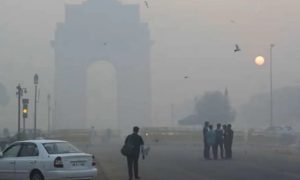The study also highlighted that the levels of PM 2.5 (particulate matter of diameter less than 2.5 micrometres) was significantly higher than the levels reported by the nearest outdoor government monitors.
New Delhi: The indoor air pollution levels in Delhi homes is more than 20 times the World Health Organisation (WHO) standards, a study by the Energy Policy Institute at the University of Chicago (EPIC India) has shown.
The study also highlighted that the levels of PM 2.5 (particulate matter of diameter less than 2.5 micrometres) was significantly higher than the levels reported by the nearest outdoor government monitors.
The study released on Wednesday also showed that while high-income households were 13 times more likely to own air purifiers as compared to low-income households, its impact on indoor air pollution was only around 10%.
The study further noted an 8.6% decline in indoor PM2.5 levels in homes with pollution monitors (usually with air purifiers), and said that such residents were likely to make “modest changes in inexpensive defensive practices and ventilation behaviours.”
“In Delhi, the bottom line is, whether someone is rich or poor, no one gets to breathe clean air,” said Kenneth Lee, the lead author of the study.
“It is a complex vicious cycle. When you do not know about the pollution levels inside your homes, you do not worry about it, and hence you are less likely to take corrective actions. Only with increased awareness, demand for clean air may gain momentum,” he added.
The study surveyed thousands of Delhi households from varying socioeconomic strata between 2018 and 2020. and found that indoor PM2.5 levels tend to spike in the mornings and evenings when households were most likely to be cooking.
Experts said that while there is growing awareness among people on the harmful impacts of outdoor pollution, people are still unaware about how the air inside their homes, offices and schools can also be highly polluted.
“We need to create awareness among people. While there are a lot of studies about outdoor pollution and how severe it can be for your health, more studies are needed to assess the levels of indoor pollution and how they can impact people. At least you can gear yourself with masks outdoors but inside your homes, you tend to drop your guard,” said Anumita Roychowdhury, executive director (research and advocacy), Centre for Science and Environment.





































